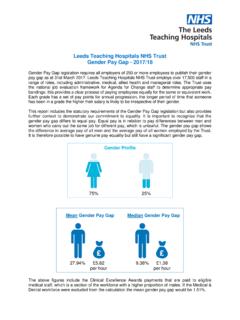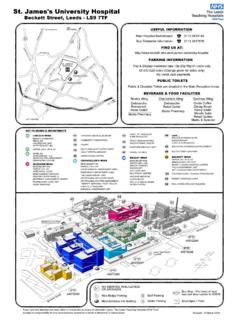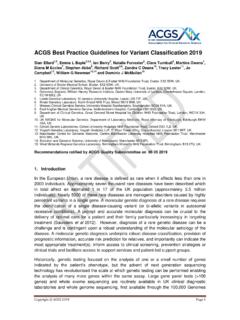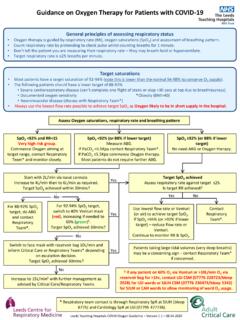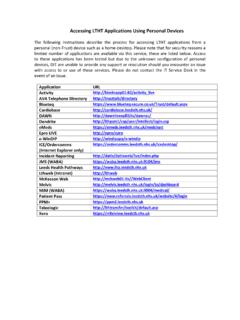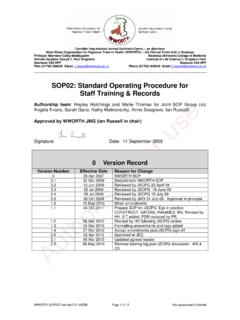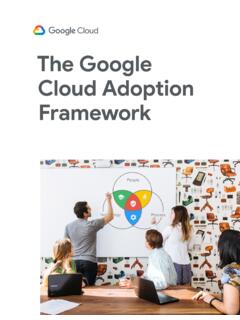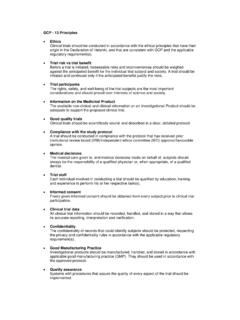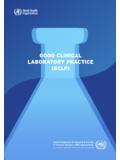Transcription of Protocol Deviations and Serious Breaches of GCP in a ...
1 UoL/LTHT Quality Assurance Bulletin #7 - April 2018 Page 1 of 3 Protocol Deviations and Serious Breaches of GCP in a Clinical Trial of an investigational medicinal product (CTIMP) 1) What is a Protocol deviation ? A Protocol deviation can be described as any departure from the approved trial Protocol . Deviations from trial protocols and GCP are a frequent occurrence in clinical trials and are usually minor Deviations that do not have a significant impact on the trial subject s safety or the trial s scientific value.
2 Some Deviations will be impossible for the research team to predict and as such, it is highly likely that occasional Deviations will occur despite a research team s best efforts to avoid them. Examples of Deviations that may be identified during a clinical trial include, but are not restricted to: A patient not attending a trial visit within the time window specified by the Protocol A Protocol mandated test not being performed at the required trial visit Samples not being processed by the laboratory in accordance with the Protocol Consent was obtained using a superseded version of the consent form All Deviations must be reported to Sponsor QA immediately (where possible) and no later than three working days in accordance with Sponsor processes.
3 Although a deviation may seem minor to an investigator, and therefore not reportable to the MHRA, it is only the Sponsor that is permitted to make this assessment. (Please see Section 4 for further information on reporting to Sponsor). 2) What is a Serious Breach of Good Clinical Practice (GCP) or the Protocol ? A Protocol deviation that is suspected or known to have the potential to significantly impact on a patient s safety, physical or mental integrity or scientific value will be classified as a Serious breach.
4 Sponsor QA review all reported Deviations to assess if there is the potential that it may constitute a Serious breach. If additional information is required, QA will contact the research team and may also seek further advice from external clinicians and senior Sponsor management to aid review. If a suspected Serious breach is confirmed, it must be reported to the MHRA within seven calendar days. For single-site CTIMPs Sponsored by the University of Leeds (UoL) or Leeds Teaching Hospitals NHS Trust (LTHT), it is Sponsor QA who are responsible for this onward reporting to the regulator.
5 Examples of Serious Breaches in clinical trials include, but are not limited to: An investigator failed to reduce or stop trial medication in response to specific laboratory parameters as mandated by the Protocol A trial participant was dosed via the incorrect administration route Safety testing ( ECG tests) were not carried out as per the trial Protocol The Trial Master File (TMF) was destroyed prior to the agreed retention time A subject was dosed with the IMP from an incorrect treatment arm If a suspected Serious breach is identified, by a research team, efforts should be made to notify the Chief Investigator (CI) / Principal Investigator (PI) as soon as possible, however this must not delay reporting to QA.
6 UoL/LTHT Quality Assurance Bulletin #7 - April 2018 Page 2 of 3 If a research team has any concerns or uncertainty as to whether a Serious breach has been identified, please contact Sponsor QA immediately to discuss further. 3) Why does the Sponsor need to review all Deviations ? Reporting all Deviations may seem like a lengthy and time consuming process to researchers if they have assessed the event and are content that it is non-reportable. However this is an essential step to ensure efficient trial management and maintain appropriate Sponsor oversight.
7 Primarily, the Sponsor is assessing each reported deviation to determine if it is a reportable breach, however one seemingly minor deviation can result in a reportable breach if there have been multiple similar Deviations that indicate a systematic issue. This approach is vital in influencing aspects of the trial such as Protocol development and can help identify if an amendment is required. For example, amending the Protocol to include a +/- window around a trial visit may minimise future Deviations from the visit schedule.
8 It is therefore essential that Sponsor QA make every effort not to review a deviation in isolation. For this reason, Sponsor QA log all reported Deviations and review this in conjunction with each new deviation to ensure the most effective corrective and preventative actions (CAPA) can be implemented. 4) How are Deviations identified? There are many ways that Deviations to the trial Protocol or GCP can be identified. It is important that a research team has processes in place to ensure that these are identified and reported in a timely manner.
9 It is often incorrectly assumed that all Deviations can be identified via the CRF ( out of window visits, missed tests), however the CRF is not able to identify several other types of non-compliance ( incorrect sample processing, the consenting of subjects to the incorrect version of consent form) that could impact on the trial s integrity. It is therefore essential that the entire research team are aware of not only the process for reporting Deviations to Sponsor, but also have appropriate checks in place to ensure that Deviations are identified in real time.
10 Appropriate training and processes for the identification and reporting of Deviations must be in place prior to the trial commencing. All Protocol Deviations and suspected Serious Breaches must be appropriately recorded and reported to the Sponsor, regardless of the Investigator opinion ( even if the investigator does not consider the deviation to be a reportable breach). All Deviations for CTIMPs Sponsored by the UoL or LTHT must be reported to Sponsor QA (via using a CTT20 LTHT / UoL CTIMP Protocol Deviations , Violations and Potential GCP Breaches form in accordance with the SOP QCRES_02_Researchers Guide to Protocol Deviations , Violations and Potential GCP Breaches .)
